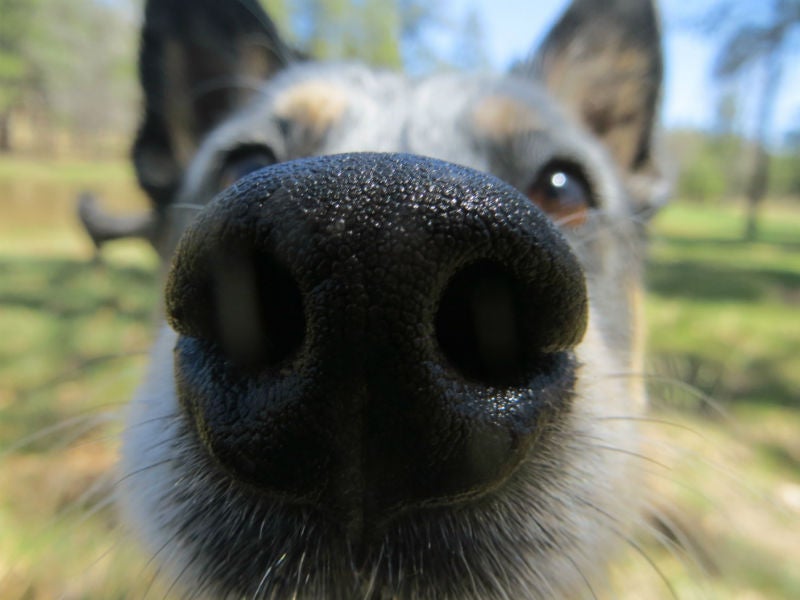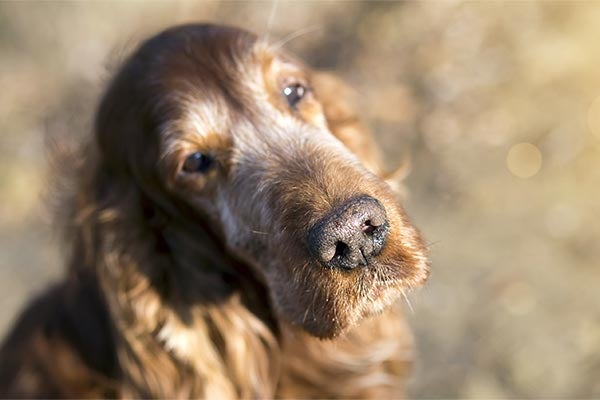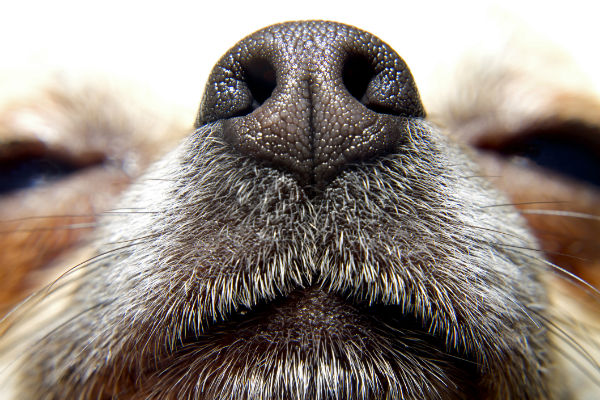
Most dog owners would probably tell you that a cold, wet nose on their canine companion signals a healthy pup. Likewise, many believe a dog is sick when his nose is dry — but is this true?
Before we get into that debate, we first need to understand why dogs have wet noses. The answer is simple: wet noses work better. Dogs depend on their highly developed sense of smell to interpret their world, and scent particles stick better to moist surfaces. That wet nose also cools your dog down on hot days, similar to how panting regulates his body temperature.
The lining of your dog’s nose contains special mucus-producing glands that keep his nasal passageways moist, along with producing a clear, watery fluid that helps keep him cool. Dogs also lick their noses on a regular basis to keep them clean. All that sniffing can result in dirt and pollen collecting around your dog’s nostrils, and licking serves two purposes: not only does it keep your dog’s nose wet, but pups can also interpret smell through taste, thanks to a highly specialized olfactory organ called the Jacobson’s organ.
So, What Does It Mean When a Dog’s Nose Is Dry?
As convenient as it would be to have an easy way to gauge sickness in dogs, there are several perfectly normal reasons why a dog’s nose might be warm or dry, and it is worth noting that sick dogs can have wet noses, too.

Let’s take a look at some possible explanations as to why your dog’s nose might be dry:
- Your dog was napping. Sleeping dogs don’t usually lick their noses, so they may wake up with warm noses.
- Dehydration from exercise. Strenuous exercise is dehydrating, which can lead to a dry nose.
- Exposure to the elements. Exposure to hot sunlight, wind, or cold can dry your dog’s nose, and, in some cases, may result in chapped or sunburned snouts. Lying next to a source of heat, like a fire or a heat vent, can also cause dry skin on your dog’s nose.
- Age. Some dogs develop dry noses with age.
A hot, dry nose doesn’t always mean trouble, but it can certainly be a sign of fever, dehydration, or even conditions like dry eye. If your dog’s dry nose is accompanied by other symptoms, like lethargy, vomiting or diarrhea, or changes in activity or appetite, contact your veterinarian for advice.
Looking and touching your dog’s gums and noting their color can yield more accurate information than his nose. If gums are moist, that’s a sign of good hydration. If they’re very dry, or tacky, it could be a sign of dehydration. If gums are a nice pink, like a person’s, it’s a good sign. Pale gums could be an indication of anemia or low blood pressure. If your dog has bright red-purple or pal blueish gums, he should be examined by a veterinarian right away.
Common Reasons Your Dog’s Nose is Dry
Your dog’s nose is dry while he’s sleeping. This happens simply because your dog is not licking his nose while he’s asleep. His nose should be wet again within 10 minutes of waking up.
Winter is tough on a dog’s nose. Do you ever wake up with a dry, scratchy throat during the winter months? That’s probably due to the flow of warm air from heating vents. Warm airflow can have the same effect on a dog’s nose. Has your pup been sleeping right next to a vent to keep warm? That warm air can dry out his nose and things should return to normal once he moves away from the heat source.
Along with indoor heating, the cold air and winds of winter also cause a dry nose. Think of how dry and chapped your lips get when you’re outdoors in winter. That’s similar to what happens to a dog’s nose.
Older dogs may have drier noses. If you notice this as your dog ages, a dab of nose balm will help keep his nose moist.
Brachycephalic breeds are prone to dry nose. Dogs with short snouts, like Pugs and Bulldogs, often have difficulty licking their nose. You may have to apply moisturizer to keep it moist. Other breeds, Lhasa Apsos, for example, are prone to blocked tears ducts, which can also cause the nose to dry out.

Conditions or Illnesses that can Cause a Dog’s Dry Nose
Allergies can a cause dry nose. Dogs can have allergies just like humans, and one of the symptoms is a dry nose. Talk to your veterinarian about determining the cause of the allergy and getting a prescription allergy medication to relieve your dog’s dry nose.
A dry nose can be a sign of sunburn. Some breeds, especially those with thin coats or pink or pale nose and eyelids are especially susceptible to sunburn. But even thick-coated breeds aren’t immune. This is especially prevalent in the summer months. Use a sunscreen to protect your pet.
Dehydration causes a dry nose. This could be the result of strenuous exercise, especially in hot summer weather. Make sure your dog has access to plenty of cool, fresh water. Stay alert to other signs of dehydration; you may need to consult your vet.
Dry nose is sometimes a sign of an auto-immune disease. Although this isn’t the first thing to think of when your dog’s nose is dry, discoid lupus erythematosus or pemphigus – both auto-immune diseases – can cause a dog’s nose to dry out, crust, and crack.
Most of the time, a dry nose is just a dry nose. If it’s chronic and your veterinarian sees no signs of allergies or disease, you may need to use a prescription lotion or balm to keep his nose moist. Because dogs lick their noses so often, whatever you use should be safe to eat. The nose is a dog’s chief sensory source of information and you want to keep it in top working order.
This article is intended solely as general guidance, and does not constitute health or other professional advice. Individual situations and applicable laws vary by jurisdiction, and you are encouraged to obtain appropriate advice from qualified professionals in the applicable jurisdictions. We make no representations or warranties concerning any course of action taken by any person following or otherwise using the information offered or provided in this article, including any such information associated with and provided in connection with third-party products, and we will not be liable for any direct, indirect, consequential, special, exemplary or other damages that may result, including but not limited to economic loss, injury, illness or death.

